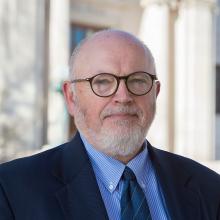Philip Bess
Professor, School of Architecture, University of Notre Dame, USA


Professor, School of Architecture, University of Notre Dame, USA
He teaches graduate urban design and theory, with a particular interest in Catholic and classical humanist intellectual and artistic traditions in the context of modern American life and the contemporary culture of architecture and urban design. Under his direction between 2006 and 2018, the Notre Dame graduate urban design studio began an ongoing, episodically funded, multi-year project called After Burnham: The Notre Dame Plan of Chicago 2109, which envisions metropolitan Chicago at the bicentennial of the 1909 Plan of Chicago, and is devoted to exploring whether and how Notre Dame's professed classical humanist ideals might be applied at the scale of the modern metropolis. Before coming to Notre Dame in 2004 he taught architecture and urban design at the University of Illinois at Chicago, Michigan, Miami of Ohio, Calvin College, and Andrews University. He lectures widely, and is the author of numerous articles and three books: City Baseball Magic: Plain Talk and Uncommon Sense About Cities and Baseball Parks (Knothole, 1991); Inland Architecture: Subterranean Essays on Moral Order and Formal Order in Chicago (Interalia / Design, 2000); and Till We Have Built Jerusalem: Architecture, Urbanism, and the Sacred (ISI, 2006). In 2013-14 he was a William E. Simon Visiting Fellow in Religion and Public Life in Princeton University's James Madison Program in American Ideals and Institutions; in May 2015 he received the degree Doctor of Humane Letters honoris causa from The Dominican School of Philosophy and Theology in Berkeley, California; and he is a Fall 2019 Fellow of the Notre Dame Institute for Advanced Study.
My current research interests generally organize themselves around a broadly Aristotelian understanding of cities as agrarian-urban places that are simultaneously "communities of communities" that as cities exist to promote individual human flourishing understood as a life of moral and intellectual excellence lived in community with others; and that this basic idea (including the dignity of every human person, and exactly who belongs to the human community) has been extended and expanded in the historic wedding of classical humanist virtue ethics anthropology with a biblical understanding of creation, sin, history, eschatology, and (n.b. urban) redemption. This metaphysical realist understanding of the nature and purpose of cities (and architecture) informs my interest in the following three research topics, inter-related but in no particular rank order: